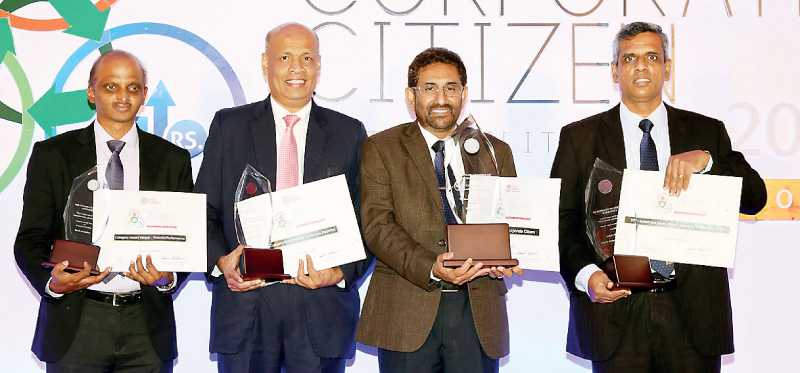Wednesday Feb 25, 2026
Wednesday Feb 25, 2026
Monday, 19 April 2021 01:19 - - {{hitsCtrl.values.hits}}

The ‘Best Corporate Citizen Sustainability Awards 2020’ recognised Bank of Ceylon as one of the ‘Top Ten Corporate Citizens in Sri Lanka’.
The largest financial institution in the country with over 80 years of sustainable growth together with the Sri Lankan community, the Bank of Ceylon has always borne the interest of enhancing socio-economic wellbeing of all its stakeholders.
The bank recognises this award with honour, as an accreditation to this commitment. Organised by the Ceylon Chamber of Commerce to empower corporate citizens who sustain industry best practices with emphasis on aspects of People, Planet and Profit for corporate sustainability, this event is one of the leading corporate award ceremonies in the country.
Bank of Ceylon General Manager D.P.K. Gunasekera accepted the award for ‘Top Ten Corporate Citizen in Sri Lanka’ on behalf of the bank. The main award came along with one triple bottom line award and two other category awards: Triple Bottom Line Award for Economic Sustainability (Profit) and Category Winner for Employee Relations, and Category Winner of Financial Performance.
During the year 2019, the bank has reported 8% YoY growth in its income and 10% YoY growth in its net profit. The bank has reported an 11% YoY reduction in its Profit Before Tax (PBT), mainly showcasing the impact to the financial industry stemming from the badly hit economy resulted from the unexpected Easter Sunday Attacks.
The bank was able to retain stable and focus on helping out badly hit tourism and related sector businesses via loan restructuring, rescheduling and administrating the CBSL introduced moratorium. Even with low margins, the bank showed a growth in its business volumes during the year and reported YoY increase in assets, deposits and loans by 6%, 13% and 8% respectively.
Growing its business continuously with significant YoY improvements and reporting a growth in baseline profit especially in a highly-volatile environment with many unexpected challenges, showcase the adoptability and the soundness of strategies incorporated.
The bank has always been vigilant in distribution of its value creation to entire country with special attention to socio-economically disadvantaged areas. In terms of resource allocation, the Bank of Ceylon has a most widespread branch network consisting of 646 branches and 1,361 ATM/CDM/CRM digital contact points, 159 branches and 412 contact points are in economically disadvantaged areas.
Altogether the bank has the strength of over 2,000 physical customer touch points spread across the country. Apart from physical branches BOC also has established a strong digital channel presence and played a pivotal role in bridging fin-tech gap between urban and rural communities. Benefits of modernisation of branches and the technology upgrades such as software, network, etc. are mostly aimed at rural and marginal communities. The bank’s roots are strongly bonded to every corner of the national economy ranging from rural sector to blue chip conglomerates and the State sector. Hence, its contribution to the national economy is substantial and vital. Bank of Ceylon is one of the largest contributors to the national coffers in terms of tax and dividends. Bonding with the Sri Lankan community with a set of common values being a good corporate citizen is woven to the core since inception. Observing United Nations’ commitment to sustainable development, urging its member states to comply with its Sustainable Development Goals (SDGs), the Bank of Ceylon has considered incorporating these objectives when formulating its business strategies. This approach has allowed the bank to achieve better performance in People, Planet and Profit (3Ps) of sustainability.
With this consideration, the bank was able to comprehensively address almost all aspects of corporate sustainability in its own way. The bank has been able to achieve more measurable/productive results by implementing these initiatives and at each step, BOC has been creating value for Economic Sustainability, Social Sustainability and Environment Sustainability for itself and all stakeholders involved.